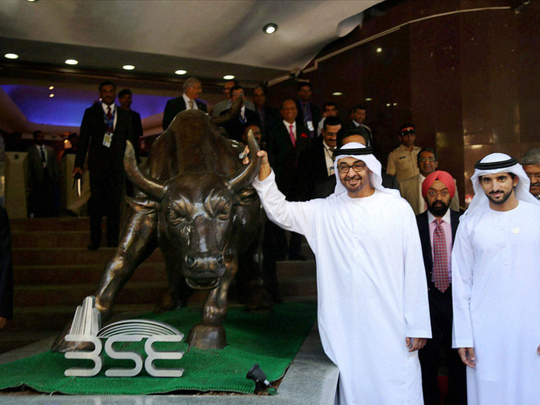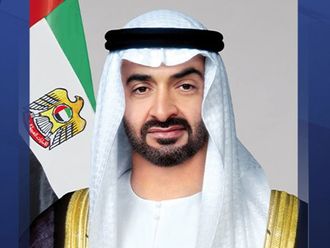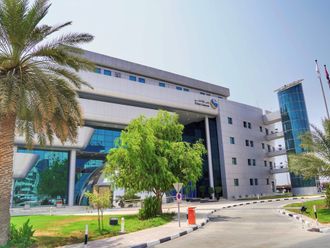
Mumbai: On the third and concluding day of his visit to India, His Highness Shaikh Mohammad Bin Zayed Al Nahyan, Abu Dhabi Crown Prince and Deputy Supreme Commander of the UAE Armed Forces, visited the Bombay Stock Exchange (BSE) in India’s financial capital Mumbai, where he attended a special bell-ringing ceremony after being welcomed by Harshvardhan Neotia, president of the Federation of Indian Chambers of Commerce and Industries (Ficci).
Afterwards, Shaikh Mohammad toured the stock exchange’s IT infrastructure and posed for a photo in front of the iconic BSE bull and attended a reception for businessmen from the UAE and India, organised by the UAE’s Embassy.
The UAE and India also released a joint statement on a range of issues at the end of Shaikh Mohammad’s three-day state visit.
Speaking to a media roundtable in Mumbai, Sultan Bin Saeed Al Mansouri, Minister of Economy, said on Friday that India has potential for growth that’s much bigger than China, but it needs to convince global investors that investment bottleneck legacies are being dealt with adequately to speed up foreign direct investment.
“We are always on lookout for the right infrastructure and investment opportunities and we also have one of the world’s largest sovereign wealth funds,” Al Mansouri said.
“India’s potential for growth is much bigger than China, mainly because of its population profile — the Indian GDP has a huge scope for growth. While India is our top trading partner, there are still some legacy issues that remain,” Al Mansouri said. He added that these related mainly to Indian investment laws and regulations, the laws that govern relations between the federal government and the states, as well as legal bottlenecks.
At the same time, Al Mansouri said, the synergy between the UAE and India on trade and investment relations was developing rapidly. “The visit of Indian Prime Minister Narendra Modi to the UAE in August last year was unique. You could feel that the chemistry between the two sides had changed, and the interest and affinity between the two sides is also reflected in the strong UAE delegation accompanying Shaikh Mohammad Bin Zayed to India,” he said.
“This visit was very important for both countries and it is very clear that India is well prepared to address legacy issues with regards to investments and the ease of doing business,” he said.
Al Mansouri said that bilateral trade in the current fiscal stood at $40 billion (Dh146.88 billion), mainly due to the dampened global business sentiment as well as the massive drop in oil prices. “What we need to do is to build a strategic relationship in investment — with a focus on manufacturing, food processing, civil aviation and economic innovation,” he said.
The UAE marked 2015 as the Year of Innovation, and Al Mansouri said this offered the chance for both India and the UAE to focus on specific strategic sectors. “We offered to our friends in India to define at least three sectors that make up the strength of the UAE and develop them together. These include IT, energy and specifically, renewable energy, and aligning the transportation, logistics and airspace sectors with innovation in the economy,” he said. The bilateral agreements on airspace also reflected that strategic focus, he said.
Speaking about future potential in civil aviation, Al Mansouri said: “In 2015, UAE airports handled 140 million passengers and our next goal is 150 million while, in India, the focus is on further augmenting the civil aviation infrastructure. This is a sector where the UAE has vast expertise and can help secure quick wins for India to facilitate the right infrastructure for attracting more investments.”
India’s vast and aspiring middle class was also a lucrative market for enhancing bilateral and sectorial aviation agreements, he said. “At the sectorial level, there are close to 225,000 weekly seats only for UAE national airlines between both countries. And the potential for growth is tremendous,” he said
However, he said a proposal to make India’s Open Skies policy applicable only to countries beyond a distance of 5,000 km was “very strange,” and hoped that such a decision would not be implemented.
As his visit concluded, Shaikh Mohammad thanked Prime Minister Modi and the people of India for the warm welcome extended to him and his delegation and extended invitations to the President and Prime Minister of India to visit the UAE at a mutually convenient time, which were gladly accepted.
The two leaders reaffirmed their commitment to building a comprehensive strategic partnership for the 21st century, noting that regular high-level exchanges play a key role in enhancing the partnership between India and the UAE.










